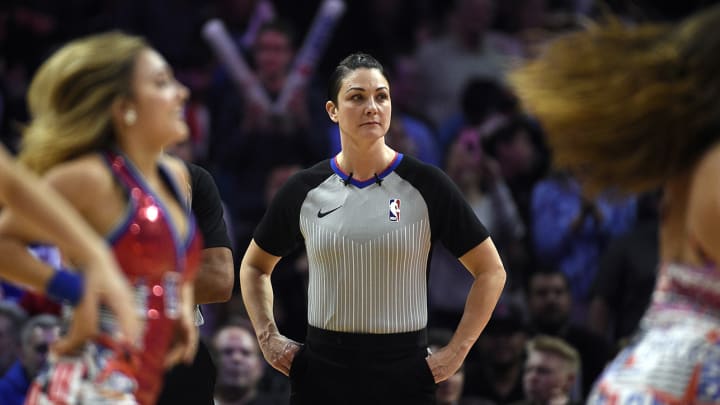As Lauren Holtkamp Flourishes as an NBA Referee, She's Also Carving a Career Path for Women


The work is important to Lauren Holtkamp. Not just the work you see, when she patrols NBA courts as a referee, but also the work before and after game time: the weekly quizzes on league rules, the collaborative study of their application to various unusual scenarios, the exacting film dissection in the hours after a game. It’s that work that empowers her to perform during those most visible two-hour exhibitions, that get her on the court in the first place. It’s that moment—when she first takes the floor—that retains all its magic, even after hundreds of games. “There is a sense of coming home,” Holtkamp says.
This past season, that moment grew in meaning. As she walked onto the hardwood, Holtkamp would scan her surroundings for similar faces. “I know that there are women doing the work alongside me, so where are they?” she says. It might be a member of the security detail or a staffer at the scorer’s table, a TV broadcaster or even a coach, such as the Spurs’ Becky Hammon. “You’re taking 30 seconds, a minute to be like, Hey, how’s it going? How’s the family?” Holtkamp explains. “Brief moments can be very important.”
More women are working in and around the NBA than ever before, but they are still rare in Holtkamp’s role. When she was hired in 2014 after six years in the league’s officiating development program, Holtkamp became the third female official in NBA history, after the league’s 1997 hiring of Dee Kantner (who has been an NCAA ref since her 2002 dismissal) and Violet Palmer (who retired in 2016 and now works in the league’s operations office).
It is not a status Holtkamp spent much time envisioning before she was on a path toward it. After finishing her collegiate basketball career as a power forward at Division II Drury College in 2004, Holtkamp began pursuing a career as a chaplain while looking for a way to remain connected to her sport. A former teammate’s father invited her to a local referees’ meeting, leading to her officiating her first middle and high school games in Missouri. The money helped boost her meager budget as a graduate student (studying communications) while also offering a fresh thrill in its own right. “To connect with the sport as a referee was very different and exciting,” she says.
Once she started studying for a master’s in divinity at Emory, she began working as a chaplain in a hospital and a women’s prison. It was demanding work, and officiating on the side helped balance her life. “Working at a hospital at the time, it’s very much head and heart work,” Holtkamp says. “Then I’d work a game and it would just be about running, the physicality, reacting and responding to what’s happening on the floor—processing it.”
A chance meeting helped transform her therapeutic side hustle into a fulltime career. In 2008, Holtkamp met Kantner at a WNBA game and picked her brain about officiating; Kantner put Holtkamp in touch with George Toliver, who ran the NBA’s referee development program. That summer Holtkamp attended Toliver’s officiating school, where working with current NBA refs gave her an invigorating firsthand glimpse at the people who were doing the job at its highest level. “I just looked at them like, Oh my gosh, if I can do this, I want to do this,” Holtkamp says.
It wasn’t long before she was hired to work in what was then the NBDL (now the G-League), which in turn led to a spot in the WNBA. “That was really when I said, This is the direction I’m going. I’m all-in on this as a career path.”
Only when she was in the NBA’s egalitarian environment did she realize how her previous experience had been limited due to gender. Where male colleagues had the option to officiate both men’s and women’s games, her only opportunities were to work the latter. “The horizon just seemed shorter,” Holtkamp says. Working men’s games with NBA officials during the developmental process offered her affirmation. “It was really critical for me, not only from a skill-development standpoint but, Can I fit in? Can I be part of this community? And I found from the beginning that I could.”
After two seasons of reffing in the NBA Summer League, Holtkamp got the call-up to the main roster in 2014. As the new face in a league where so many players and coaches have been entrenched for years and even decades, she felt a pressure to acquit herself well. There was also the added element of being a woman, which increased the potential for criticism or even outright dismissal of her competency. “Just a few years ago I would have said, Oh, every new referee feels that way,” Holtkamp says. “And I do think every new referee feels that way. But I also think being a woman, walking into that masculine, competitive environment, that’s part of it too.”
Her rookie season proved trying. That February, Holtkamp issued a technical foul to then-Clippers guard Chris Paul for inbounding the ball too quickly during the third quarter of a game against the Cavaliers. “That’s ridiculous,” Paul told reporters after the game. “If that’s the case, this might not be for her.” A public controversy ensued. The National Basketball Referees Association released a statement saying, “We deplore the unprofessional comments made by Chris Paul. She belongs.” Paul was fined $25,000.
“What I found in that first season is that it was important to me to learn skills to get back to that quiet place—just quieting the noise and doing the work,” Holtkamp says. “It was a difficult way to come into the work, but I also think that it created opportunities for me to learn to manage the noise, which I think has served me well.”
Among Holtkamp’s tools for doing so are meditation and painting. She uses a one-minute meditation app on her phone to center herself and clear her mind before the chaos of a game begins. She also travels with a set of oil pastels that she uses to paint in her hotel rooms, finding peace by following the brush wherever it may lead her.
One place she still hopes to go is the playoffs, which she has yet to officiate in her four NBA seasons. First she will have to recover from offseason knee surgery, which she is rehabbing at the Florida home she shares with her husband, fellow NBA ref Jonathan Sterling, and their five-year-old rescue dog, MJ. She is also in touch with a number of younger refs, including women, who are in the league’s developmental system. And there are some bigger-picture thoughts on her mind as well.
“Something that I’m curious about,” Holtkamp says, “is what does it mean to use the fact that I’m a woman as an entry point into the work? What I mean by that is, I have certain experiences and strengths and challenges of what it means to move through this world as a woman. How do I access all of that and put it toward good and sort of funnel it for an effective, positive outcome? But I don’t know the answer to that yet. I’m figuring that out. I think it’s a process.
“It’s not about trailblazing or becoming a poster person for any cause,” she adds later. “It’s actually about showing up for the work as well as I possibly can and always just doing the work. Then the conversation that we’re having now comes on the back end of it. But it’s always just about the work.”
More From Only Woman In The Room
• Female Powerhouses Reveal the Mistake They're Glad They Made
• Angela Bassett, Constance Zimmer, and more share their rejection stories
• Fundraising Advice From Female Founders Who Raised Serious Cash
• Breaking Ground for Women - PAID CONTENT
• Driving the future with Sheryl Connelly – PAID CONTENT

